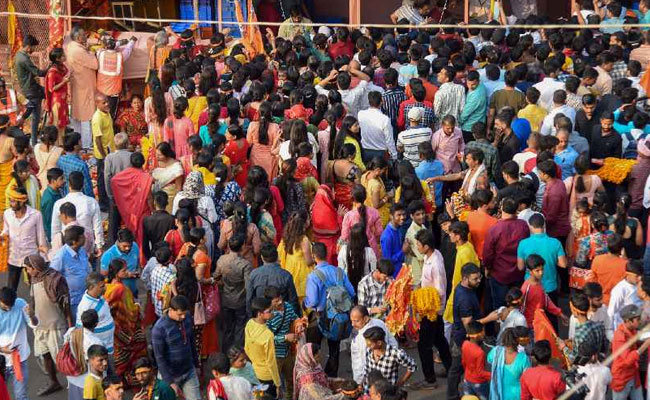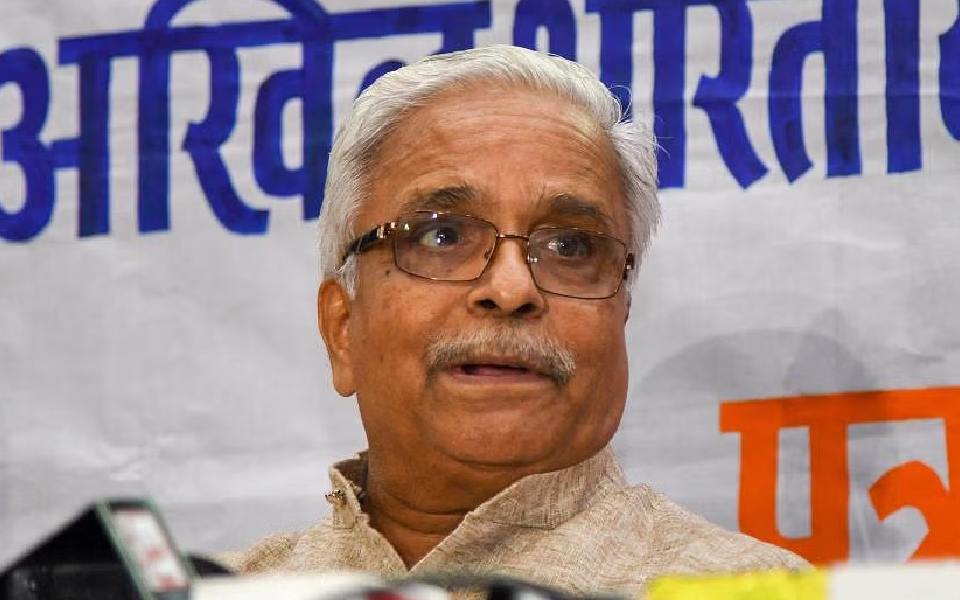Mumbai (PTI): Police have registered a first information report (FIR) against nearly 300 persons and arrested 21 so far in connection with a clash between two groups during a Ram Navami procession in Mumbai's Malvani area, an official said on Friday.
The incident occurred on Thursday night at Malvani in suburban Malad (West) when the procession was going on and some people objected to high volume DJ and loud music accompanying it.
Those involved in the clash are being identified with the help of drone and CCTV footage of the area at the time and action is being being according to their role, he said.
While nearly 300 persons have been booked, police have arrested 21 persons so far and more arrests are likely, the official said, adding that the probe in the case underway.
In the FIR, police have pressed charges under Indian Penal Code sections 353 (assault or use of criminal force to deter a public servant from discharge of his duty), 324 (voluntarily causing hurt by dangerous weapons or means), 332 (whoever voluntarily causes hurt to any person being a public servant in the discharge of his duty as such a public servant), 145 (joining or continuing in unlawful assembly) and 143 (unlawful assembly).
Earlier, police had apprehended more than 20 persons on the charge of rioting and said the process to place them under arrest was on.
During the clash between the two groups on Thursday night, stones were hurled, which triggered panic in the area. Additional police force was called in and the police personnel used force to disperse the crowd, the official said.
Senior police officials and some local political leaders rushed to the spot and appealed for peace, he said.
After the incident, supporters of a right-wing organisation gathered outside the Malvani police station and demanded action against those who allegedly pelted stones.
A large number of police personnel were deployed in the area and the situation was brought under control, he added.
Let the Truth be known. If you read VB and like VB, please be a VB Supporter and Help us deliver the Truth to one and all.
New Delhi, Jan 23 (PTI): The National Company Law Appellate Tribunal (NCLAT) on Thursday stayed a five-year ban imposed by competition watchdog CCI on data-sharing practices between WhatsApp and its parent Meta for advertising purposes, offering a breather to the tech giant.
Meta had challenged the Competition Commission of India's (CCI) directive issued in November 2024 that imposed a ban on data sharing between WhatsApp and other Meta entities for advertising purposes, warning it may have to roll back some features.
It had also slapped a Rs 213 crore penalty on Meta for abuse of its "dominant position."
The NCLAT also stayed the Rs 213.14-crore penalty, subject to deposit of 50 per cent of the penalty amount (after taking into consideration 25 per cent already deposited), within two weeks.
The tribunal observed that ban of five years that was imposed may lead to the collapse of business model which has been followed by messaging platform WhatsApp. It further noted that WhatsApp is providing its services to its users free of cost.
"We have also noticed that the Supreme Court has not granted interim order staying 2021 privacy policy and Digital Personal Data Protection Act 2023 has also been passed and is likely to be enforced which may cover all issues pertaining to data protection and data sharing. We are of the prima facie view that the ban of five years imposed...need to be stayed," it said while listing the next hearing on March 17.
The CCI had concluded that WhatsApp's 2021 privacy policy update unfairly compels users to agree to wide collection of data and its sharing within Meta group.
Meta welcomed the "NCLAT's decision to grant a partial stay on the Competition Commission of India's (CCI) order" and said it will evaluate next steps.
"While we will evaluate next steps, our focus remains on finding a path forward that supports millions of businesses that depend on our platform for growth and innovation as well as providing high-quality experiences that people expect from WhatsApp," a Meta spokesperson said.
In November, the CCI imposed a penalty of Rs 213.14 crore on social media major Meta for unfair business ways with respect to the WhatsApp privacy policy update done in 2021.
Meta Platforms and WhatsApp had challenged this order before the NCLAT, which is an appellate authority over the orders passed by the CCI.
In its 156-page order, the CCI had on November 18, 2024, directed Meta to cease and desist from anti-competitive practices.
According to that CCI order, Meta and WhatsApp have also been asked to implement certain behavioural remedies within a defined timeline to address the anti-competition issues.
The regulator called for implementing various remedial measures, including barring WhatsApp from sharing data collected on its platform with other Meta companies or Meta company products for advertising purposes for five years.
Among other directions, CCI had said that sharing of user data collected on WhatsApp with other Meta companies or Meta company products for purposes other than for providing WhatsApp services shall not be made a condition for users to access WhatsApp services in India.
Murugavel Janakiraman, CEO & Founder, Matrimony.com said that the decision of the National Company Law Appellate Tribunal (NCLAT) on Meta’s appeal against the CCI ban on WhatsApp’s data sharing policies underscores the limitations of the existing ex-post nature of the competition law and highlights the need for ex-ante regulations.
"Ex-ante rules restricting ‘data usage’ as proposed in the draft Digital Competition Bill can go a long way in preventing large digital platforms/gatekeepers from abusing their dominant position sometimes even to the disadvantage of the end-users," Janakiraman said.
As such, the ex-ante provision aims to ensure that behaviours of large digital enterprises are proactively monitored and that the CCI intervenes before instances of anti-competitive conduct transpire. In an ex-post framework, intervention happens after the occurrence of anti-competitive conduct.





